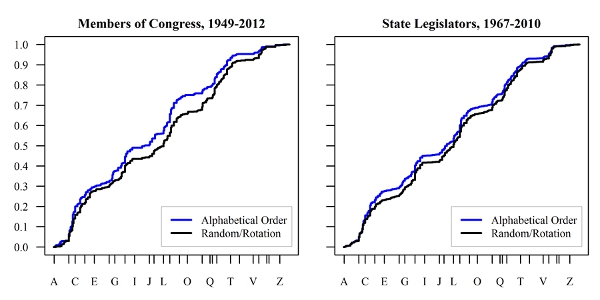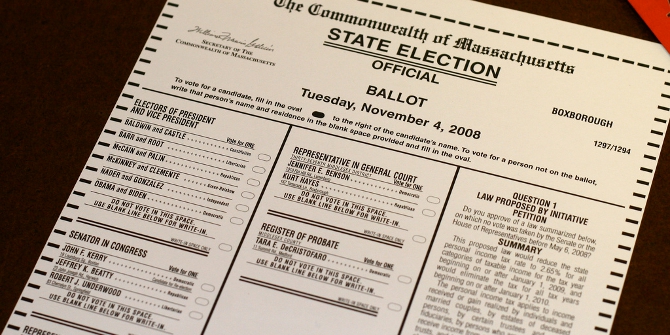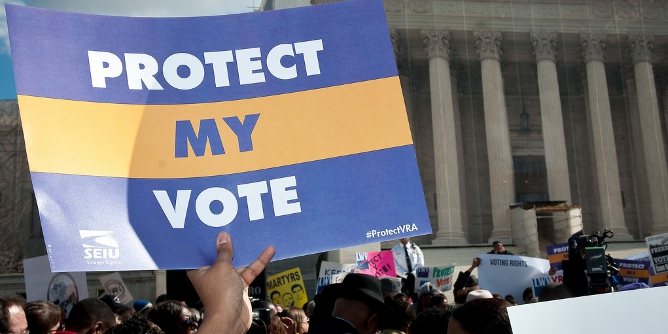 It is relatively well known that candidates who are first on the ballot tend to enjoy a vote advantage compared to those whose names begin with letters later in the alphabet. But how much of a difference has this made to election results? In new research which analyzes the names of members of Congress from 1949 to 2012 and state legislators from 1967 to 2010, Barry Edwards finds that alphabetical ballot lists account for the results in 10 Congressional seats and more than 70 seats in state legislatures. He argues that alphabetically ordered ballots undermine the principle of fair elections, and that reform of ballot order rules is needed.
It is relatively well known that candidates who are first on the ballot tend to enjoy a vote advantage compared to those whose names begin with letters later in the alphabet. But how much of a difference has this made to election results? In new research which analyzes the names of members of Congress from 1949 to 2012 and state legislators from 1967 to 2010, Barry Edwards finds that alphabetical ballot lists account for the results in 10 Congressional seats and more than 70 seats in state legislatures. He argues that alphabetically ordered ballots undermine the principle of fair elections, and that reform of ballot order rules is needed.
Conventional political wisdom suggests the candidate listed first on a ballot enjoys a slight windfall of votes cast by those who don’t know or care enough to consider all their options. By focusing on particular elections, researchers have neglected to consider the broad consequences of arbitrary ballot ordering rules on legislative representation. To evaluate the substantive significance of ballot order rules, I compare the legislators of states that alphabetically order ballots to legislators elected by states that randomize or rotate ballot order. My research suggests that the seemingly innocuous choice of some states to alphabetize ballots has significantly altered the composition of state legislatures and even Congress.
Scholarly interest in how ballots are designed and organized predates the explosion of interest in the subject generated by the 2000 Presidential Election. Most studies suggest the first candidate listed on a ballot enjoys an above average number of votes in certain elections. The less that voters know or care about the election, the greater the windfall of votes to the first listed candidate. Think how often you click the first link in Google search results and don’t bother to consider all your options. However, when the stakes are relatively high, as in partisan legislative elections, scholars suggest ballot order has little or no influence on voters. Accordingly, some have concluded that the distortions induced by ballot order are confined to low-level elections and do not affect the general political landscape. I was sceptical of this sanguine assessment of ballot order effects and looked at the impact of alphabetically ordering ballots on high-level legislative offices. I found that the practice of alphabetically ordering ballots, used in a number of states, significantly distorts the composition of their state legislatures and congressional delegations in favour of representatives with early-alphabet names.
Early Advantages Persist
I suspected that relatively small advantages to early-alphabet candidates in low-profile elections might distort the political process generally because in highly competitive endeavours, slight advantages, particularly those enjoyed early in a career, can set some on the road to success and stunt others’ development. We’ve seen how small advantages in youth sports alter the composition of professional leagues years later. Malcolm Gladwell’s (2008) popular book Outliers: The Story of Success highlighted how calendar cut-off dates in youth hockey leagues affect who later plays professional hockey. January babies are not inherently better hockey players, but they are bigger, faster, and more coordinated when they start playing hockey (they are nearly 20 percent older than December babies in a league for five-year-olds with a Jan. 1st cut-off date). Children born early in the year enjoy more opportunities to develop their skills and progress from one level to the next so the small, early advantage persists. Could the same thing happen in politics? Perhaps alphabetically ordering ballots gives certain candidates an edge at the beginning of their careers which gives them greater opportunities to advance to higher and higher offices. If so, we would expect legislators elected in states that alphabetically order ballots to have more early-alphabet names than those elected by states which utilize ballot ordering methods that neutralize name advantages.
My research takes advantage of the fact that states have used different methods of ordering their ballots. I identified sixteen states that have ordered primary election ballots alphabetically (some of these states alphabetize ballots in other types of elections as well) and twenty states that have ordered by random assignment or by rotating multiple versions of their ballots among precincts. I use legislators elected by states that rotate or randomize the order of candidates on ballots as a comparison group because these practices neutralize potential name advantages. (I don’t compare legislators’ names to the distribution of names in the general population because there may be some general advantages to early alphabet names in all states).
I analyze the names of members of the 81st to 112th Congresses (1949 – 2012) elected by these two sets of states as well as the state legislators they elected from 1967 to 2010. To test whether alphabetizing ballots distorts who gets elected to these high offices, I use a statistical method that tests whether two samples have the same distribution (the Kolmogorov-Smirnov two-sample test). To conduct the test, I compare the proportions of legislators who have last names before different points in alphabetical order and see whether the different exceeds a pre-determined critical value. Plotting these distributions helps us perceive both the magnitude and direction of differences in our observations.
Figure 1 – Comparison of legislators who have last names before different points of alphabetical order

Figure 1 above compares the congressional delegations and state legislatures of states that alphabetically order ballots to those of states that randomize or rotate the order of candidates on their ballots. With respect to Congress, the maximum distance between distributions is .094 (which occurs at “Mi”). For state legislatures, the gap between distributions reaches .045 (at “Go”). Both of these differences exceed the critical values for 99 percent confidence so one would reject the hypothesis that these observations have the same distribution.
The aggregate impact of alphabetically ordering ballots is surprisingly large. The differences observed in congressional delegations and state legislatures equates to a shift of ten seats in Congress and seventy-one seats in state legislatures in favor of politicians with early-alphabet surnames compared to name-neutral ballot ordering rules. Although arbitrary ballot ordering rules do not intentionally discriminate against a protected class, they compare in magnitude to the effect of poll taxes and literacy tests used in a number of states until the 1960s to supress African American representation. If one assumes that other static ballot ordering methods affect elections like alphabetic ordering affects representation in states studied here, the overall impact of ballot ordering rules on political representation may be double that of alphabetic ordering alone.
Assessing Alternative Explanations
It is important to consider whether something other than using different ballot ordering methods causes these differences. Accordingly, in my research I conduct a number of additional tests to assess alternative explanations and check the robustness of my findings:
- Within-State Comparisons. Because some states started or stopped alphabetically order ballots during the time frame of this study, we can make some before and after comparisons. Evidence from Florida, Indiana, New Hampshire, and Rhode Island supports the main findings.
- Controlling for Demographic Differences. To assess the possibility that differences in state demographics, rather than ballot ordering rules, explains the main findings, I separate the sample of legislators into subsamples of different racial and ethnic groups. I find that the Hispanic, African American, and white state legislators elected in states that alphabetically order ballots have earlier alphabet names than their counterparts in states that randomize or rotate ballot order.
- Controlling for Other Differences. I compare other subsamples of state legislators and find the same name-differences among legislators elected to open seats (a control for incumbency advantages), Republicans, Democrats, Senators, and Representatives.
- Randomization Inference Testing. Finally, I conduct a randomization inference test to evaluate possibility some other unspecified variable accounts for differences documented in this research. The p-value of this randomization inference test equals 0.004. Other groupings of states (based on unspecified variables) are extremely unlikely to produce the differences in representation observed here.
The Need for Ballot Reform
Based on my research, I believe that ballot order affects preliminary contests like elections to minor offices and primary elections which, in turn, affect general election outcomes and the composition of state and federal legislatures. Alphabetically ordered ballots may create a slight advantage for candidates with early alphabet names at a formative time in their political careers in much the same way as a January 1st cut-off date for registering in youth hockey leagues gives rise to a relative age advantage for children born early in the calendar year. My results challenge the view that ballot ordering rules are innocuous administrative details. I estimate that the distortion resulting from alphabetic ordering in the United States is roughly equivalent to the representation of a medium-sized state or the effect of literacy tests and other historic barriers to voter registration on African American representation.
Election rules that eliminate positional advantages, such as randomizing or rotating ballot order, may be more complicated and costly to administer than simply listing candidates in alphabetical order, but this research suggests that states which alphabetically ordered ballots may not be represented by legislators who enjoy the most support in the electorate. The practice may cause less deserving candidates to win office, leaving these states worse off. Additionally, in other research, I have found that alphabetically ordering ballots puts particular racial and ethnic groups, notable Asian-Americans, at a significance disadvantage. My research underscores the need to reform ballot order rules in order to conduct fair elections. Given the magnitude and complexity of policy issues on both the state and federal levels, we should be wary of arbitrary rules for ordering ballots that interfere with the election of the best qualified candidates for public office.
Featured image credit: liz west (Flickr, CC-BY-2.0)
Please read our comments policy before commenting.
Note: This article gives the views of the author, and not the position of USApp– American Politics and Policy, nor of the London School of Economics.
Shortened URL for this post: http://bit.ly/1QlSYSW
_________________________________________
 Barry Edwards – University of Central Florida
Barry Edwards – University of Central Florida
Barry Edwards is in the Department of Political Science at the University of Central Florida. His research interests include elections and legislative behavior, the U.S. presidency, adjudication and alternative dispute resolution, and state politics.






2 Comments